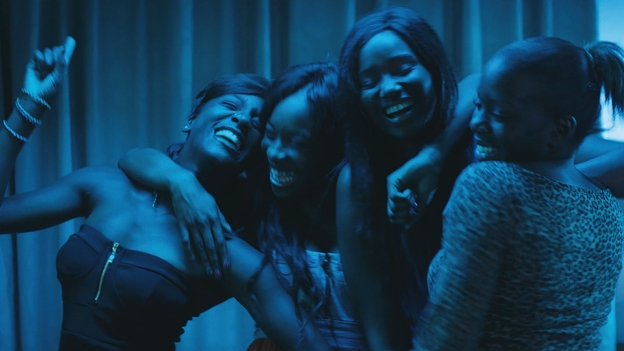Monday 20 October 2014
LFF Review: Girlhood
I seem to have an excellent track record for picking good final films to see at festivals. (Aside, that is, from the time at Cannes when I stumbled, weary from long queues and hot weather into The Colour of Pomegranates, not expecting a beautiful and still mediation on life) At last year's London Film Festival, my last viewing was a little-known film called 12 Years a Slave which of course never got picked up by a distributor and received any success… And this year I managed to once again pick an absolute gem, in the form of Celene Sciamma's third feature, Girlhood.
The film follows the life of Marieme, (or "Vic", short for victory as she is renamed) as she tries to juggle life in a French banlieue, a difficult home life, first love and new friendship. Her world is suddenly turned upside down when she is befriended by a gang of tough girls, lead by the beautiful and seemingly fearless Lady. Coming of age is by now a well-worn genre, as is the "gang" movie, but Girlhood manages to be a breath of fresh air for one reason - the gang shown here are comprised of young black girls. This may not seem like much, but ask yourself the last time that a young black woman - and in this case, a multitude of them - were really allowed any authority in film. While they may associate with, or even sleep with members of a male gang, Marieme, Lady and co never allow themselves to become gang member's mols. The whole film is focussed on Marieme's decisions and how they effect her life - if she ever becomes a passive figure in the film, that decision is down to her.
With Girlhood, Sciamma offers the best argument for the concept of the Female Gaze in a long time. It's undeniable that she and her camera adore her subjecst. Shot in harsh neon lighting, or in near darkness, Marieme's skin often appears to glow. There are a multitude of shots of female bodies in this film but they always amount to more than just a sum of a few parts. Instead, Sciamma seems enraptured by these girls, and passes this rapture on to the audience. Whether shown dancing to R&B in crop tops and shorts, or in the midst of a ferocious game of rugby, there is no denying that these girls are physically beautiful, but they are never overtly sexualised for a purely male viewpoint. Most refreshingly of all, Sciamma uses this view not just in her camerawork but in her script too. In an intimate scene between the four friends, Marieme shares a memory of walking behind all of them - "All I could think was that you were beautiful, so beautiful." That's not the say that there's no female rivalry in the film - there are ferocious fights between Lady, Vic, and the leader of an opposing gang - but here they fight with their fists, not with easy disses with "slut" and "whore", and they fight for power, rather than men.
All in all, Girlhood is an electrifying look at female friendships and coming of age from a director who seems to relish the subject. From the blue-tinged cinematography (giving the film a cold but deeply powerful look, contrary to last year's Warmest Colour which the film will almost certainly be compared to) to the scene in which the girls, in shoplifted dresses, mime along to the entirety of Rihanna's "Diamonds", there is so much to look at, and to love, here. But better yet, Sciamma is able to touch an emotional chord - not just with the black women - or any women in the audience for that matter - who come to see it, but rather with everyone. The film encompasses many emotions - happiness, fear, love, hate - and it is impossible to not feel at least one of them whilst watching it.
Grace Barber-Plentie
4.5/5
Subscribe to:
Post Comments (Atom)


No comments:
Post a Comment